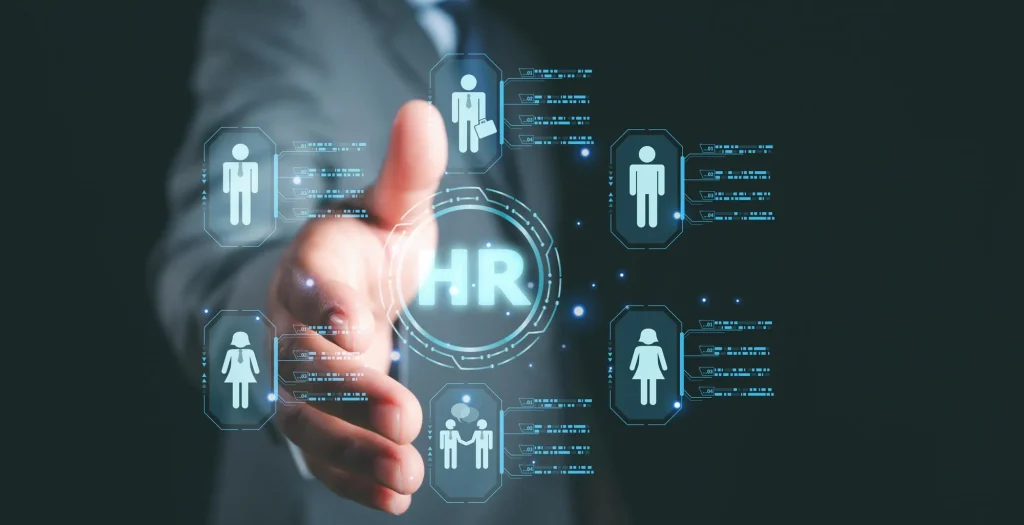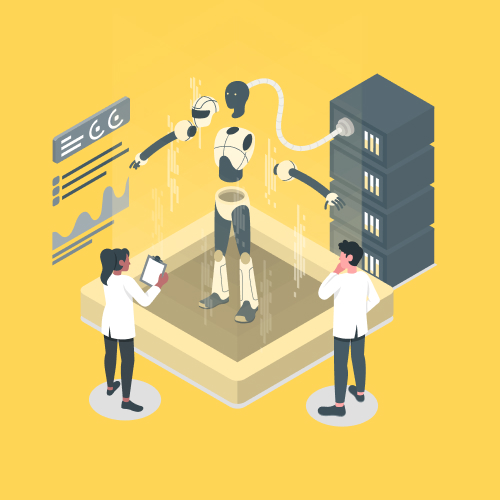As AI technologies become more prevalent, they offer significant benefits like improved efficiency and data-driven decision-making.
However, these advancements also bring important ethical considerations to the forefront.
By addressing these concerns, organisations can harness the power of AI while maintaining trust and fairness within the workplace.
The rise of AI in HR
The use of AI in HR is rapidly evolving, impacting areas such as recruitment, performance management, and employee engagement.
Tools like MiHCM’s suite of products, including MiHCM Data & AI and SmartAssist, exemplify how AI can optimise HR processes. These tools provide advanced analytics and automation capabilities, helping to streamline operations while ensuring ethical considerations are prioritised.
As AI continues to revolutionise HR, it is crucial for businesses to remain vigilant about the ethical implications involved in its application.
The importance of ethical considerations
Ethical considerations are paramount when implementing AI in HR, as they directly impact employee fairness and privacy.
Issues such as bias, transparency, and data privacy are at the heart of ethical AI usage. Ensuring these elements are addressed not only builds trust among employees but also enhances the overall credibility of AI systems.
HR leaders must focus on developing ethical AI strategies that include accountability measures and continuous monitoring of AI-driven decisions.
The complexity of AI ethics requires a proactive approach, emphasising the balance between technological advancement and human-centric values. By integrating ethical considerations into their AI strategy, HR leaders can build a foundation for a more equitable and trusted workplace.
The surge of AI in HR is undeniable, bringing both opportunities and challenges, particularly surrounding ethics. But what exactly does AI ethics mean in this context?
AI ethics in HR revolves around deploying AI-driven technologies responsibly, ensuring they align with organisational values and employee rights. This encompasses considerations of fairness, transparency, and accountability, which are critical to fostering trust among stakeholders.
Key ethical challenges in AI-driven HR

As the role of AI in HR expands, several ethical challenges stand out. Key among them is bias and fairness.
AI systems are not immune to biases, which can inadvertently be embedded through training data or algorithmic design. Such biases can lead to unfair treatment in recruitment, appraisals, or even termination processes. Addressing these biases is critical to maintaining equity within the workplace.
An essential element in managing ethical AI is transparency.
Ensuring that AI-driven decisions are explainable to both HR professionals and employees is vital. This transparency fosters trust and allows for accountability, where stakeholders can question or validate decisions made by AI systems.
The balance between leveraging AI for efficiency and maintaining ethical integrity is delicate but essential for sustainable deployment in HR.
The MiHCM suite of products exemplifies how organisations can transform their workplaces responsibly by integrating advanced HR analytics. These tools offer data-driven insights that can streamline HR processes while remaining aligned with ethical standards, enhancing productivity and engagement within the workforce.
Transparency and accountability in AI-driven decisions
Ensuring accountability in AI decisions involves setting up robust mechanisms that track and evaluate the outcomes of AI applications.
Establishing checkpoints or reviews where human inputs are considered can significantly mitigate risks associated with AI decision-making processes. This not only supports a fairer work environment but also enhances strategic HR decision-making by combining human intuition with machine precision.
AI ethics is not just about compliance but fostering a culture where technology serves human interests ethically and effectively. By embedding these principles deeply into the corporate fabric, HR leaders can set benchmarks for AI ethics best practices, instilling confidence in technology-driven HR operations.
Potential risks
One of the primary risks is the introduction of bias in AI-driven processes.
AI systems often rely heavily on historical data, which can be full of existing biases. These biases may unintentionally skew towards particular groups, leading to unfair hiring, performance evaluations, or promotions.
Another significant risk pertains to data privacy. AI systems handling sensitive employee information must ensure robust data protection mechanisms are in place to prevent unauthorised access or breaches.
Moreover, with AI decision-making becoming more autonomous, the lack of transparency in how decisions are made poses a risk. This opacity can result in reduced accountability as employees may not fully understand or trust AI’s role in key HR processes.
Lastly, there is the risk of dependency on AI, where organisations might feel compelled to relegate crucial human judgment to technology, thereby impairing nuanced decision-making.
Mitigation strategies

To address these risks, companies should implement strategies to ensure that AI-generated decisions are both fair and transparent.
Establishing fairness involves regular audits of AI systems to identify and correct biases. Organisations can employ diverse datasets during AI model training to reduce skewed results.
- Data privacy protection: Implement advanced encryption technologies and regular system audits to secure employee data and maintain compliance with standards such as GDPR.
- Transparency initiatives: Cultivate transparency by adopting AI systems that allow for explainability. Organisations can implement processes that make AI decision-making processes comprehensible, providing employees clarity and understanding.
- Human oversight: Maintain a balance between machine-generated insights and human oversight. Encourage systems where final decisions incorporate expert human judgment to verify AI recommendations.
- Continuous monitoring: Regularly evaluate AI systems’ performance to ensure they align with organisational values and do not deviate over time.
The MiHCM suite of products offers tools to efficiently process HR requests and approvals while ensuring ethical standards are upheld. These solutions are designed to enhance productivity by enabling data-driven decision-making, offering organisations visibility and control over AI processes.
Furthermore, strategic use of AI in HR can lead to optimised workforce strategies, enabling businesses to transform operations without compromising ethical values. HR leaders must adopt a proactive approach, leveraging AI responsibly to ensure a future-ready workplace that champions both innovation and ethics.
The concept of fairness in AI algorithms is often complex, especially within the HR sphere.
It is essential that the AI systems employed in human resources uphold ethical considerations by ensuring equitable treatment of all employees. This involves mechanisms that proactively prevent bias in AI-driven HR processes.
- Algorithmic fairness: AI systems should undergo regular assessments to identify and rectify any inherent biases. Implementing checks during the development phase can aid in minimising unintended bias.
- Inclusive training datasets: Ensuring that AI models are trained on diverse data sets reduces the risk of skewed decision-making. Incorporating varied employee demographics fosters an environment of equality.
Moreover, transparency plays a crucial role in increasing trust in AI-driven decision-making. Organisations must establish clear channels for conveying how AI systems function and the criteria used in decision-making processes.
- Transparent processes: AI applications should offer clarity about their decision-making pathways. This involves explaining the algorithmic processes and the reasons behind particular AI conclusions or recommendations.
- Audit trails: Implementing audit mechanisms helps track and verify AI system activities. This not only aids in identifying discrepancies but also ensures accountability at every level.
Best practices for maintaining accountability in AI use within HR include employing frameworks that set clear ethical guidelines, ensuring continuous monitoring, and fostering a culture where employees can question AI decisions freely.
MiHCM products effectively embody these principles, offering features designed to ensure fair and transparent HR processes while adhering to ethical AI practices. By doing so, MiHCM optimises workforce management and decision-making, aligning technology with human-centric values.
Adhering to a framework of fairness and transparency in AI-driven HR decisions isn’t just about compliance; it’s about redefining HR dynamics in a way that champions equity and ethics, facilitating a seamless integration of technology that serves the workforce rather than overshadowing it.
Data privacy concerns
AI systems in HR often handle vast amounts of sensitive employee data, from personal details to performance metrics. The concern lies in ensuring this data is not only protected against breaches but also managed transparently.
Employees must be confident that their data is collected and used ethically, which is crucial for building trust.
Concerns also arise from AI’s predictive analytics capabilities, which could potentially infringe on employee privacy if not regulated properly.
Compliance requirements
Compliance with data protection regulations such as the General Data Protection Regulation (GDPR) is non-negotiable for HR systems utilising AI.
Organisations must ensure strict adherence to these regulations, which include obtaining explicit consent for data processing, providing access to data collected, and ensuring data portability.
Compliance also requires regular audits and assessments of AI systems to verify continued adherence to legal standards.
- Consent and notification: Organisations must ensure they inform employees about data collection methods and obtain their explicit consent before processing their data with AI systems.
- Data minimisation: Only data essential for the AI operation should be collected, limiting access to sensitive information.
Secure data management practices
Implementing robust data management practices is crucial to protecting employee information within AI-driven HR systems:
- Encryption and anonymisation: Adopt advanced encryption methods to safeguard data during transfer and at rest. Anonymising data when possible adds an additional layer of security.
- Access controls: Define clear access controls to limit who can view or manipulate data, ensuring only authorised personnel have access based on necessity.
- Regular audits: Conduct frequent audits of AI systems and data management practices to detect vulnerabilities or non-compliance issues proactively.
Solutions like MiHCM Data & AI prioritise these elements, offering built-in data protection and compliance features designed to safeguard employee information. This ensures organisations can leverage AI while maintaining a strong ethical stance on data privacy, aligning with both organisational values and regulatory requirements effectively.
As we navigate the intricacies of AI in human resources, it is crucial to prioritise ethical implications that align with core organisational values. AI technologies offer potential transformative capabilities, but ensuring they are implemented ethically is paramount.
Looking forward
- Summary of ethical considerations: When integrating AI into HR, organisations must prioritise factors such as bias mitigation, transparency, accountability, and data privacy. These elements are vital to embedding AI responsibly and transparently within human resources processes.
- Human-centric approach: It is important to maintain a human-centric approach that emphasises AI as a supportive tool rather than a replacement. This involves equipping HR teams with AI solutions which can effectively enhance productivity while focusing on unlocking employee potential.
- Continuous evaluation and adaptation: AI systems must be subject to regular evaluations to stay aligned with ethical standards and organisational goals. MiHCM embodies this principle by providing mechanisms for performance analysis and skill development, ensuring AI remains accountable and relevant.
By emphasising ethics in AI implementation, organisations can harness the full potential of AI, transforming HR operations into a beacon of strategic and ethical leadership.



